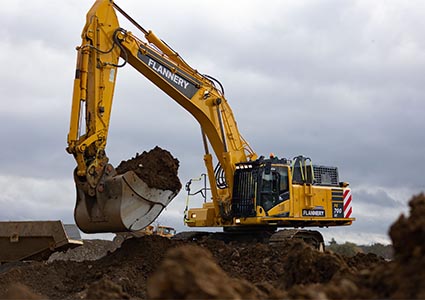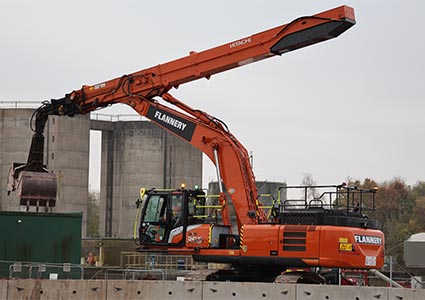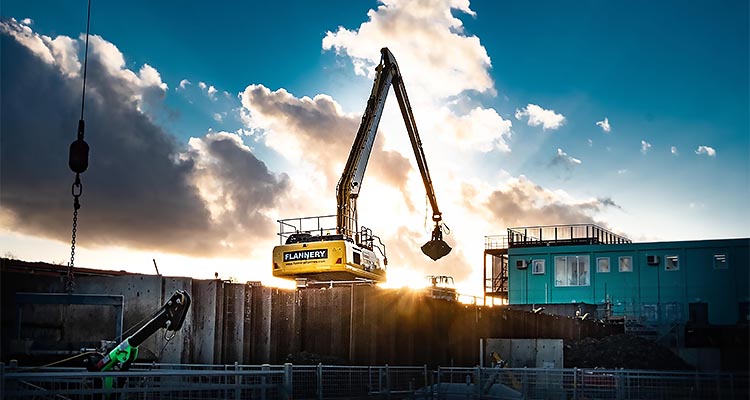Flannery Plant Hire provides the most innovative, advanced and environmentally responsible plant and equipment available
Flannery Plant Hire (Flannery), founded in 1972 by Patrick Flannery Senior (Paddy), is one of the largest and most established plant hire companies in the UK. The company began with just a single piece of equipment, a 3CX backhoe loader, which marked the start of what was then a small family-run business. Providing plant machinery for local construction projects, Flannery quickly earned a reputation for reliability and high-quality service.
As demand grew, so did the company’s fleet and operations, expanding into a key supplier of heavy equipment for large-scale infrastructure projects across the UK. A major milestone in Flannery’s history was its focus on maintaining a modern and well-maintained fleet, which helped the company become a preferred supplier for government contracts and major projects such as the Network Rail Crossrail Project and HS2.
 In recent decades, Flannery has placed a strong emphasis on innovation and sustainability. The adoption of advanced technologies, including machine control systems and hybrid equipment, supports environmental goals and boosts operational efficiency. Its Eco Operator Training programme and investment in electric, hybrid, and hydrogen combustion machinery reflect the company’s commitment to reducing carbon emissions and improving fuel efficiency.
In recent decades, Flannery has placed a strong emphasis on innovation and sustainability. The adoption of advanced technologies, including machine control systems and hybrid equipment, supports environmental goals and boosts operational efficiency. Its Eco Operator Training programme and investment in electric, hybrid, and hydrogen combustion machinery reflect the company’s commitment to reducing carbon emissions and improving fuel efficiency.
Today, Flannery operates a fleet of over 5200 machines and provides nationwide service from 15 depots across the UK. Despite its growth, the company remains family-owned, continuing the legacy started by Paddy. With its focus on sustainability, technology, and training, Flannery has solidified its position as a leader in the plant hire industry.
The company offers an extensive fleet of modern, low-emission equipment, including excavators, dozers, dumpers, dump trucks, telehandlers, and rollers. Its services include operated and self-drive plant hire. With a strong focus on sustainability, Flannery provides a variety of hybrid, electric, and Stage V compliant machines, which adhere to the EU’s stringent emissions standards aimed at reducing harmful pollutants. It also offers a wide range of specialised plant including zero-tail swing excavators, long-reach excavators, wheeled excavators, and tracked dumpers.
Extensive training
A significant portion of Flannery’s fleet meets the EU Stage V emissions regulations, which significantly reduce nitrogen oxides (NOx) and particulate matter (PM). This helps minimise air pollution and supports environmentally sensitive projects. These machines not only lower emissions but are also more fuel-efficient, providing operational savings for clients while contributing to cleaner, more sustainable construction.
Flannery also provides round-the-clock incident response services, ensuring rapid equipment delivery and emergency handling across the UK within hours, which is vital for infrastructure and emergency works. Fully equipped depots handle complex repair and servicing tasks, and on-site and preventative maintenance ensures that plant equipment is maintained and repaired swiftly, thereby minimising downtime.
Alongside its hire services, Flannery is proud to host skills bootcamp and workforce training. The Skills Bootcamp in Plant Operation programme is a government-backed training programme aimed at increasing the skilled workforce of plant operators while helping underrepresented groups integrate into the industry. Flannery’s Skills Bootcamp promotes opportunities for women, BAME, and disabled individuals, with a focus on breaking down barriers to entry into the construction industry.
Similarly, Flannery also offers Compliance Plus training that ensures all operators are properly certified, including Construction Plant Competence Scheme (CPCS) certification, and other certification needed for specific sites.
As touched on earlier, a further offering is the company’s Eco Operator Training programme, which aims to reduce fuel consumption and emissions by training operators to be more efficient, to minimise idle time, and improve overall plant performance. Mobile training units allow for training to be delivered to remote and geographically dispersed areas, supporting inclusivity for disadvantaged groups.
Flannery is committed to reducing emissions by 50 per cent by 2030 using hybrid, electric, and Stage V compliant equipment, alongside the planned introduction of hydrogen-powered machinery. This forms part of its broader plan to phase in hydrogen-powered machinery as an alternative to diesel, furthering its commitment to sustainability and low-carbon construction. 
Safety and innovation
Additionally, the company’s data and telematics solutions provide real-time data tracking and performance monitoring of equipment to optimise fleet usage, fuel efficiency, and emissions management. Flannery also assists clients with transitioning to electric vehicle charging and hydrogen-powered equipment, offering trials and supporting the use of cutting-edge technologies. Its comprehensive digital systems for managing fleets ensure optimal usage and performance tracking for clients.
Flannery’s in-house training centre, featuring the Operator Skills Hub, is set to significantly enhance local employment opportunities, particularly in the areas near Ipswich and Bury St Edmunds. The facility plays a vital role in developing a skilled workforce that can support regional projects such as Sizewell C, a critical infrastructure project that requires a substantial pool of trained operators.
At the Operator Skills Hub, Flannery provides a comprehensive range of training, including apprenticeships, red zone safety training, and the Eco Operator Training programme. In addition to benefiting individuals through upskilling, this centre supports the local economy by ensuring that nearby communities can access high-quality training programmes. This, in turn, increases employability and provides a skilled workforce. The centre’s activities are expected to generate local jobs, boost income levels, and drive economic growth in the region, ensuring a sustainable future for both the community and the construction industry.
At Flannery, safety and innovation are the cornerstones of the company’s operational ethos. It firmly believes that innovation is not only a driver of operational efficiency but also a crucial force in transforming safety standards across the industry. In the past 12 months, the company has implemented several safety innovations.
In collaboration with OEMs and a plant system provider, Flannery has developed a bespoke human form recognition (HFR) camera system, specifically designed to meet the unique requirements of diverse machinery. Unlike off-the-shelf solutions, this system enhances the operator’s situational awareness, reducing the risk of accidents by preventing collisions. Through the development of the HFR portal, clients can access real-time footage, allowing them to monitor safety on-site and make data-driven decisions to mitigate risks. The company has also funded independent research studies to validate the system’s efficacy, and it is now leading safety discussions across the industry.
In partnership with NOCN CPCS, Flannery is also developing an accredited people plant interface (PPI) red zone course. This programme standardises safety protocols for managing exclusion zones around active machinery, ensuring operators and personnel know how to prevent accidents by maintaining these zones. Developed to streamline workforce management, software integrates real-time updates for compliance, fatigue management, and risk assessments. Fatigue is a major cause of workplace accidents, and this software ensures operators receive timely alerts to stay compliant and fit for duty. This system has already been embedded into Flannery’s operations.
The company has also co-designed and tested the world’s first geofencing plant and machinery avoidance system: Leica XWatch 3D. This system automatically stops machinery when it enters restricted zones, significantly reducing risks associated with machine-related incidents, and is instrumental in preventing collisions with infrastructure like services and gantries, a leading cause of injury.
To further enhance safety, Flannery has introduced an innovative secondary deadman lever on all its excavators. The system links with the seatbelt, ensuring machinery will not operate unless the seatbelt is fastened. This bespoke feature, developed through extensive research, mitigates the risk of bypassing safety controls, aligning with the HSE’s findings on the causes of accidents.
The company’s fleet of over 350 dual-view dumpers is equipped with front and rear cameras to provide operators with full 360-degree visibility, addressing a critical issue of limited visibility that has historically contributed to numerous site accidents. In addition, Flannery has integrated vehicle collision avoidance systems (VCAS) to provide real-time alerts about potential hazards, reducing the likelihood of accidents.
To tackle the risks associated with working at height, Flannery has developed and patented bespoke dozer GPS mounting brackets. These brackets allow for safer and easier installation of GPS receivers, eliminating the need for operators to perform potentially hazardous tasks at height. Flannery will always focus on improving safety on site and improving technology for the betterment and safety of the industry.
